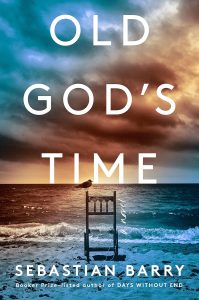Pro tip: When an epigraph cites the Book of Job, you know there’s suffering ahead.
Tom Kettle is the Job of Dublin. A decorated detective with the Irish national police who arrives at retirement not with the joy of an ex-cop looking forward to unburdened days, but bereft of all that he loved and ladened with sadness. Tom is awash in the wake of tragedy, at times so immersed he cannot distinguish the ache of memory from the pain of reality.

What scant solace Tom manages to find during his retreat to a granny flat in an ancient castle, disappears like sea mist in the night sky when he is drawn back into an old case involving sexual predation and perverted priests. Suddenly, he is deprived of what to him is “the whole point of retirement, of existence – to be stationary, happy and useless.”
But Old God’s Time – the title referring to a period beyond memory – is not a cold-case yarn as such (even if it were, it would be lifted beyond the normal realm of the trope by Barry’s lyrical and poetic writing, occasionally liberated from form, occasionally punctuated with the vocabulary of quotidian brutality). Yes, Old God’s Time, is a mystery, but the unraveling of secrets only serves as the vehicle for Barry’s deeper investigation, that of the enigmatic completeness of love and the bottomless whirlpool of loss.
Within these emotional swirls, where what is true and what is imagined intertwine, Tom struggles to find firm footing. He harbors dark truths, about himself and about his late wife, June, who he loved more than life and who, afflicted by her own haunts, “had survived everything but survival.”
In the end, what saves Tom from the bleak remains of his life is the embrace of a simple fact: of all that he’s done, of all the villains he’s dealt with, of all the erosion of his faith in human nature, he wants only one thing: “to be a believer again, in something.”
And what is that? “His life, his little life?” he thinks. “The fog edged away from the shore of himself, the sea opened like a stage in a theatre, the helpful sun burned in its element, there was a truth told to him, a truth, in his curious age, in his palpable decay, that there at the heart of it, there at the heart of it, forever and always, as June.”
Old God’s Time demands patience. Go too fast and you’ll miss Barry’s lingering eye. But bide your time, wrestle over the meanings of Tom’s untethered drifts, and be rewarded by an ending that accelerates as the cold case melts in a furnace of truth.
